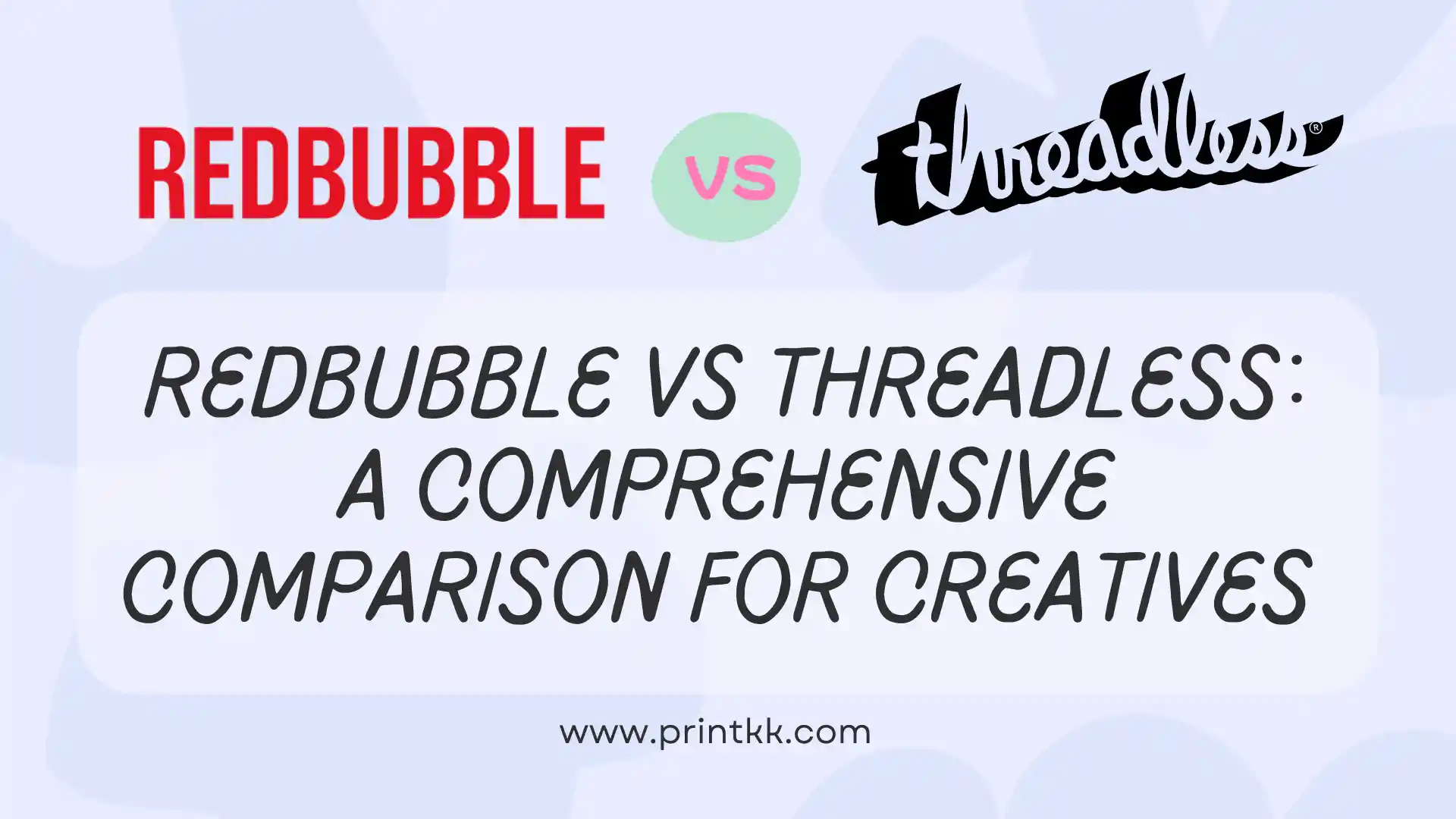
Hey there, creatives! If you've ever wondered where to showcase your art and make some money while doing it, you're in the right place. Choosing the perfect print-on-demand (POD) platform can feel like picking the right brush for your masterpiece—it's crucial for bringing your vision to life. We'll take you deep into two powerful platforms in the POD world: Redbubble and Threadless.
Both platforms offer unique opportunities and come with their own set of perks and quirks. Whether you're a seasoned designer looking to expand your reach or a newbie eager to dip your toes into the world of online art sales, understanding the strengths and differences of Redbubble and Threadless can help you make an informed decision.
So, grab a cup of coffee, get comfortable, and let's explore which platform might be the best canvas for your creativity. By the end of this guide, you'll have a clearer picture of where your art can shine brightest. Ready to get started? Let's dive in!
What Are Redbubble and Threadless?
Redbubble
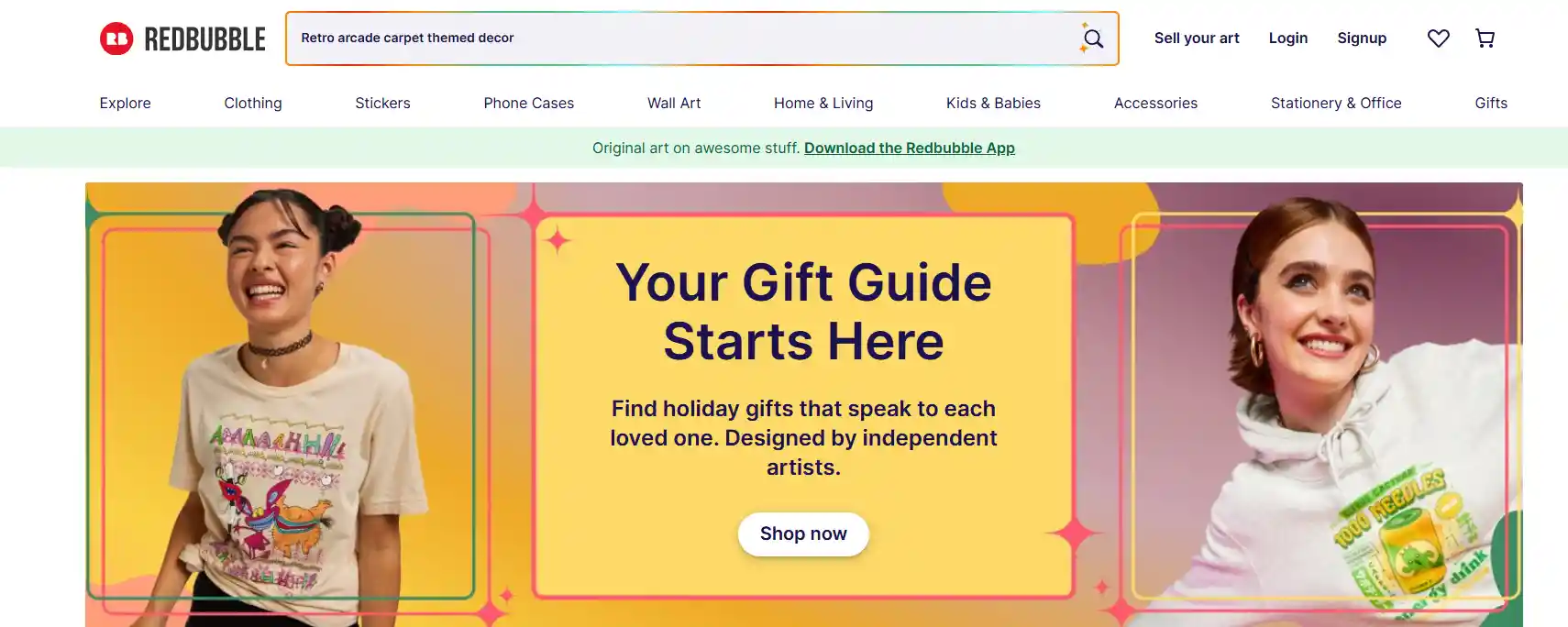
Redbubble is a vibrant and creative online marketplace where you can find all the interesting designs and unique products you want. And Redbubble allows artists to focus on creating art, while Redbubble handles the printing and shipping of the product.
This allows creatives to focus on what they do best—creating art—while reaching a worldwide audience without the hassle of managing inventory or logistics.
The selection of products offered by this platform is very wide, from wall art to fun stickers to stylish clothing, there is always something to suit your appetite.
If you're wondering "Is Redbubble legit?", the answer is yes—it's a well-established platform trusted by millions of artists and buyers worldwide. Its reliability and secure payment system make it one of the safest places for creatives to sell their designs online.
Threadless
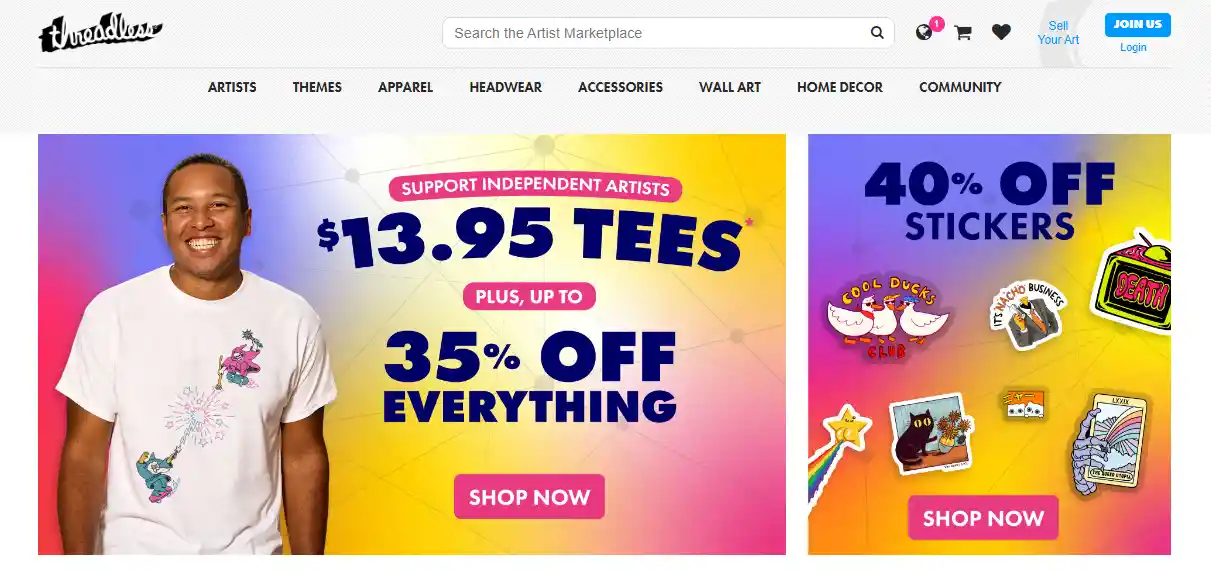
Threadless started as a small T-shirt design competition in 2000 and has since evolved into a thriving community-driven marketplace for artists. Based in Chicago, Threadless empowers designers by turning their artwork into high-quality products like clothing, home goods, and accessories.
What sets Threadless apart is its artist shop feature, which gives creators their own customizable storefronts within the platform. This means artists can build their brand while benefiting from Threadless's established infrastructure and customer base.
Like Redbubble, Threadless handles production and fulfillment, making it easier for artists to monetize their work without worrying about the operational side of things.
Why Compare Redbubble and Threadless?
Choosing the right print-on-demand (POD) platform is like picking the perfect tool for a creative project—it can significantly impact your success. Comparing Threadless vs Redbubble helps you understand which platform aligns best with your goals and creative vision.
Redbubble and Threadless are both well-established in the POD industry, each offering unique advantages. Redbubble boasts a massive global audience, making it ideal for maximizing visibility. It's like having your art displayed in a bustling international gallery. On the other hand, Threadless offers a more community-focused environment, akin to joining an exclusive club of like-minded creatives who support and inspire each other.
By comparing these platforms, you can identify which one offers better visibility, community support, financial benefits, and user experience for your specific needs. This comparison is crucial for making an informed decision that maximizes your potential, whether you're an artist, brand, or entrepreneur.
Understanding their differences in detail will help you choose the right partner for your business. Read on to learn more about Redbubble and Threadless.
A Comprehensive Comparison of Redbubble and Threadless
Audience
When it comes to reaching a broad audience, Redbubble stands out. With millions of visitors each month, it's like having your artwork displayed in a bustling international gallery. This vast exposure can be a game-changer for those looking to get their designs in front of as many eyes as possible.
Threadless offers a more intimate setting, fostering a tight-knit community of art enthusiasts. Think of it as joining an exclusive club where everyone shares a passion for creativity. Threadless users are often deeply invested in the platform's artistic culture, which can lead to more meaningful interactions and loyal followers who appreciate and support your work.
Customization
Redbubble provides extensive customization options, allowing you to personalize everything from t-shirts to home decor. It's like having a blank canvas where you can let your imagination run wild. This flexibility is particularly beneficial for artists who want to experiment with different styles or cater to niche markets.
If you're exploring Redbubble alternatives, Threadless is one of the strongest contenders because it focuses heavily on curation and branded artist shops. This structured approach can be beneficial if you prefer a more organized way to showcase your designs. Threadless curates collections that highlight specific themes or trends, which can help your work stand out within these focused showcases.
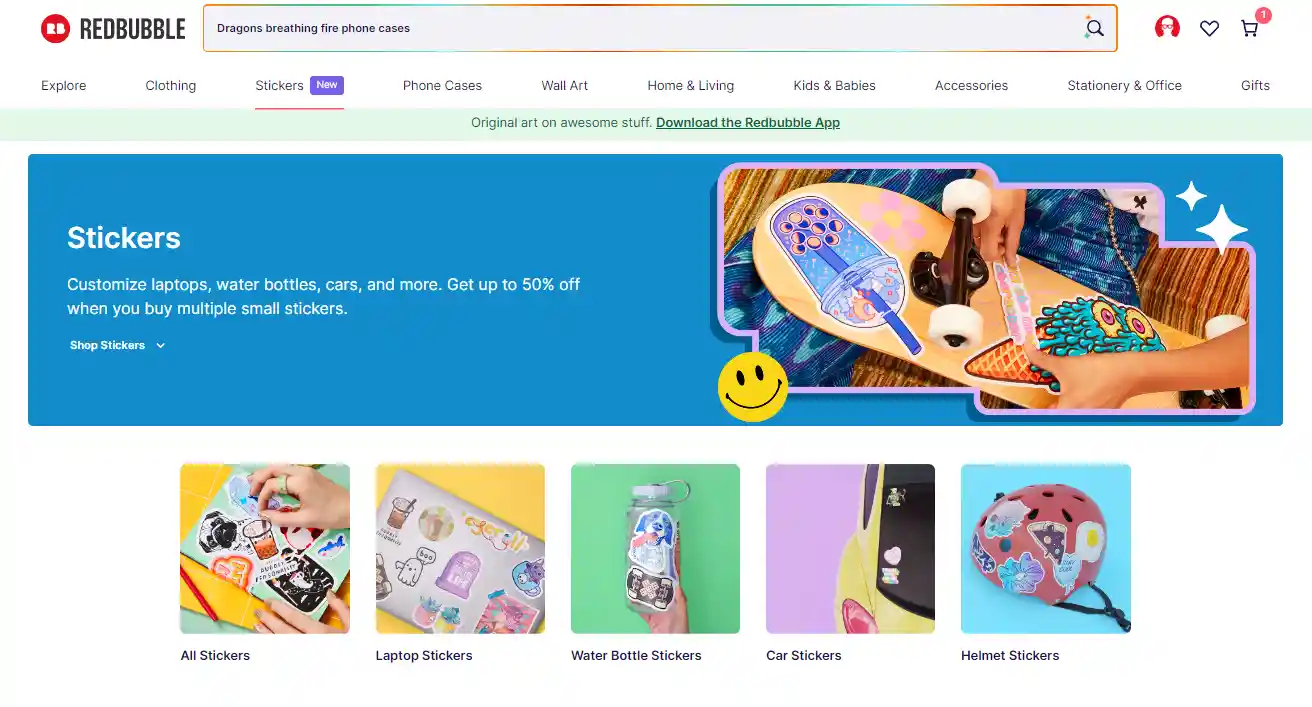
Threadless also offers customization but focuses more on curated collections and artist shops. This structured approach can be beneficial if you prefer a more organized way to showcase your designs. Threadless curates collections that highlight specific themes or trends, which can help your work stand out within these focused showcases. And the artist shop feature allows you to create a branded space where fans can explore all your creations in one place.
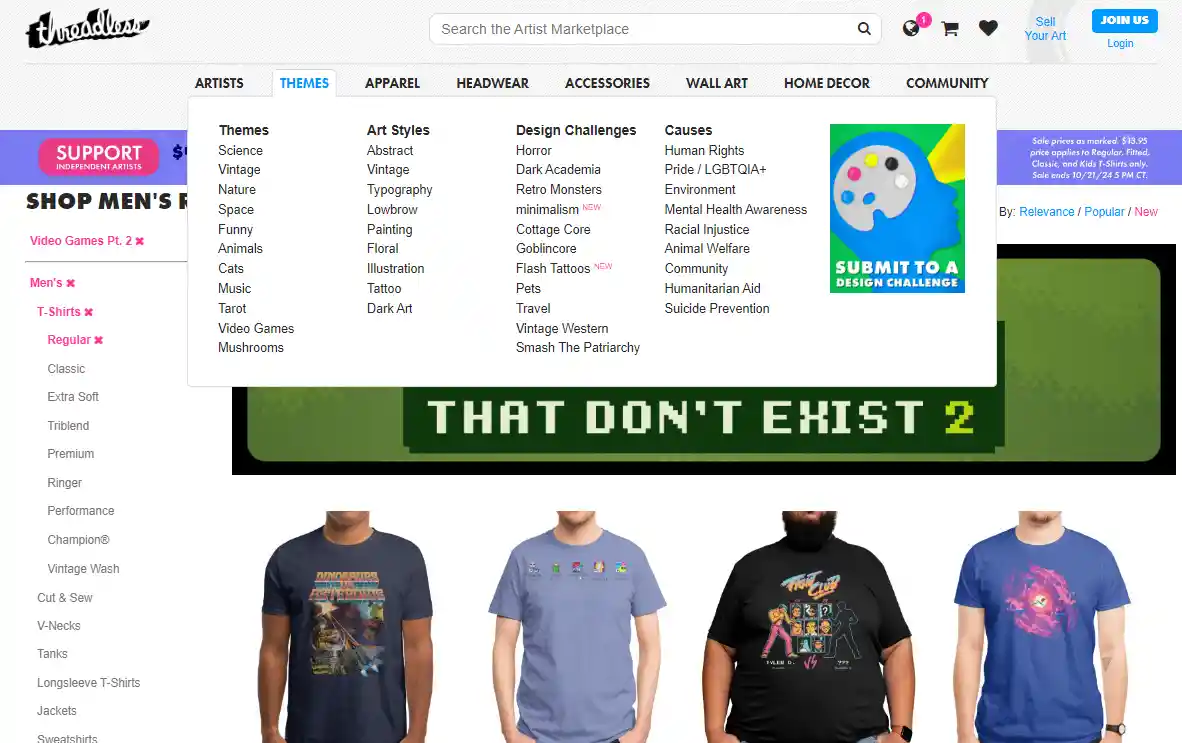
Financial Considerations
Both platforms offer competitive commission structures, but they handle pricing differently. Redbubble allows you to set your own profit margins, giving you control over your earnings. It's akin to running your own mini-store within a larger marketplace. You decide how much profit you want to make per item sold, which means you can adjust prices based on demand or special promotions.
Threadless operates on a base price model with fixed artist commissions, simplifying the process but potentially limiting your earning potential. While this model makes it easier to predict your earnings per sale, it doesn't offer the same level of flexibility as Redbubble when it comes to adjusting prices or maximizing profits.
Community and Engagement
One of the standout features of Threadless is its strong sense of community. Artists can participate in design challenges, receive feedback from peers, and engage with their audience directly. This collaborative environment is perfect for those who thrive on interaction and constructive criticism.
While Redbubble also has community features, its focus is more on individual success through broad exposure. The platform provides tools for promoting your work through social media integration and analytics to track performance. For artists who prefer working independently and leveraging wide-reaching promotional tools, Redbubble's approach might be more appealing.
User Experience
Redbubble's interface is so intuitive and simple that even newbies will quickly get used to it. And upload a picture, you can batch edit a large number of products, do not have to click each product to set. The upload process is straightforward, and managing your portfolio is simple with clear options for editing and organizing your designs.
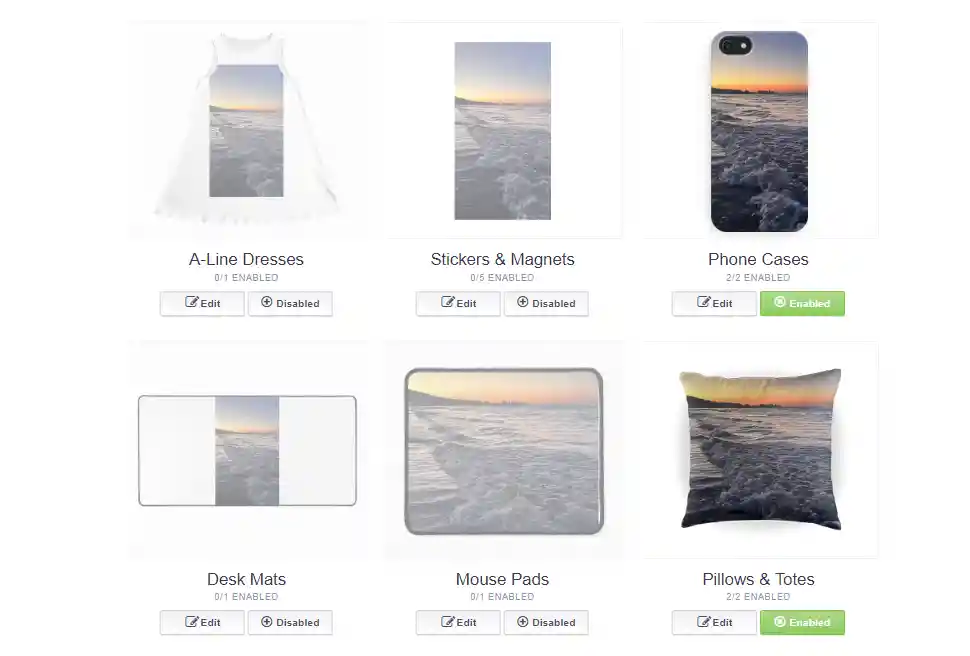
Threadless excels in community engagement, offering forums and feedback mechanisms that foster interaction among artists. This can be incredibly encouraging, especially for emerging creatives looking for support and inspiration. The platform's design challenges and voting system allow artists to get direct feedback from their peers and potential customers, creating opportunities for growth and improvement based on real-world input.
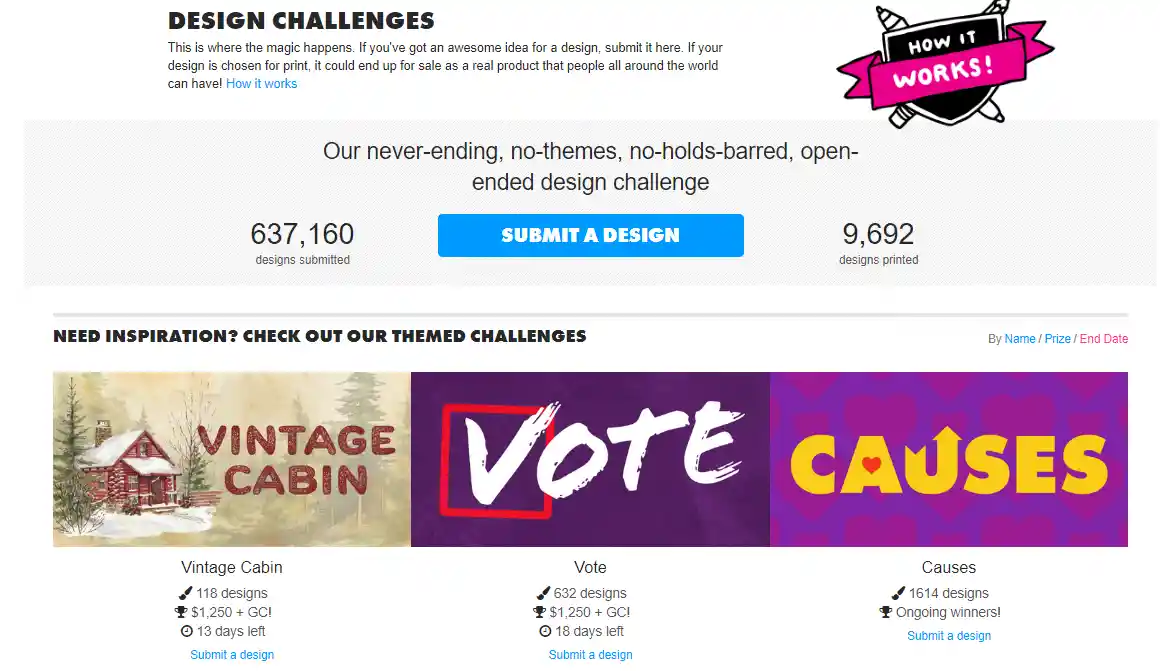
Payment
Threadless pays you every month, regardless of how much you've earned. This means you can count on a consistent income flow, even if you're just starting out or have a slower sales month. It's like having a reliable paycheck that helps you manage your finances more predictably.
Redbubble requires sellers to reach a $20 minimum payout threshold before releasing earnings. While high-volume sellers typically meet this easily, smaller sellers might experience delays in receiving their money. However, any earnings below the $20 threshold are paid out annually, ensuring you eventually receive your funds.
Read More:
- Redbubble vs Zazzle: Which Platform Is Best for Your Needs
- Redbubble vs Society6: Which One Is Better to Sell
Redbubble vs Threadless: Pros and Cons
When it comes to choosing between Redbubble and Threadless, it's essential to weigh the pros and cons of each platform. Here's a breakdown to help you decide which one might be the best fit for your creative journey.
Redbubble: Pros
| Pros | Description |
| Wide Audience Reach | Redbubble boasts millions of visitors each month, giving your designs a global stage. |
| Extensive Customization | From t-shirts to home decor, you can personalize a wide range of products, letting your creativity shine. |
| Flexible Pricing | Set your own profit margins, giving you control over your earnings and the ability to run promotions. |
| User-Friendly Interface | The intuitive platform makes it easy for beginners to navigate and manage their portfolios. |
Redbubble: Cons
| Cons | Description |
| Payout Threshold | You need to reach a $20 minimum payout threshold before receiving your earnings, which can delay payments for smaller sellers. |
| Less Community Interaction | While there are community features, the focus is more on individual success rather than fostering a close-knit artist community. |
| Saturated Market | The vast number of artists means higher competition, making it harder for new designs to stand out. |
| Quality Control Issues | Some users report inconsistencies in product quality, which can affect customer satisfaction. |

Threadless: Pros
| Pros | Description |
| Strong Community Engagement | Participate in design challenges and receive feedback from peers, fostering growth and collaboration. |
| Curated Collections | Threadless curates collections that highlight specific themes or trends, helping your work stand out within these showcases. |
| Artist Shops | Create a branded space where fans can explore all your creations in one place, enhancing brand loyalty. |
| Quality Control | Generally consistent product quality, ensuring customer satisfaction and repeat purchases. |
Threadless: Cons
| Cons | Description |
| Fixed Commissions | Operates on a base price model with fixed artist commissions, potentially limiting your earning potential compared to flexible pricing models. |
| Smaller Audience Reach | Compared to Redbubble, Threadless has a more niche audience, which might limit exposure but increase engagement quality. |
| Complex Upload Process | Some users find the upload process less intuitive compared to other platforms, which can be a hurdle for newcomers. |
| Less Product Variety | Offers fewer customization options compared to Redbubble, which might limit creative expression on different products. |
Redbubble Vs Threadless: Which Is Best for You?
Choosing between Redbubble vs Threadless can be like deciding whether you prefer a bustling city or a close-knit community. Redbubble offers a massive marketplace where your designs can reach a wide, global audience. It's perfect if you're looking to maximize exposure and let the platform handle most of the heavy lifting, from printing to shipping.
Threadless feels more like an intimate gathering of art enthusiasts. Its community-driven model allows users to vote on designs, fostering a sense of engagement and connection. If you enjoy feedback and want to build a loyal following, Threadless provides that interactive experience.
Ultimately, the best platform for you depends on what you're looking for in your creative journey. If you crave broad visibility and a hands-off approach, Redbubble is your playground. But if you value community interaction and brand customization, Threadless might be your canvas.
Both platforms have their unique strengths, so explore them with an open mind and see which one aligns with your artistic vision!
Real Comments from Reddit and Threadless Forum
When diving into the experiences shared by users on Reddit and the Threadless forum, it's clear that both platforms have their distinct strengths and quirks.
These real user insights often serve as some of the most valuable Redbubble reviews, helping new artists understand what to expect before joining.
On Reddit, laurathompson91 highlights the ease of use and consistent sales on Redbubble, noting that it's particularly user-friendly for uploading and managing artwork. She mentions that while she uses multiple POD sites, Redbubble stands out for its global accessibility and regular sales, even if they are often smaller items like stickers or masks. The satisfaction with product quality and those charming little stickers included in orders add a nice touch.
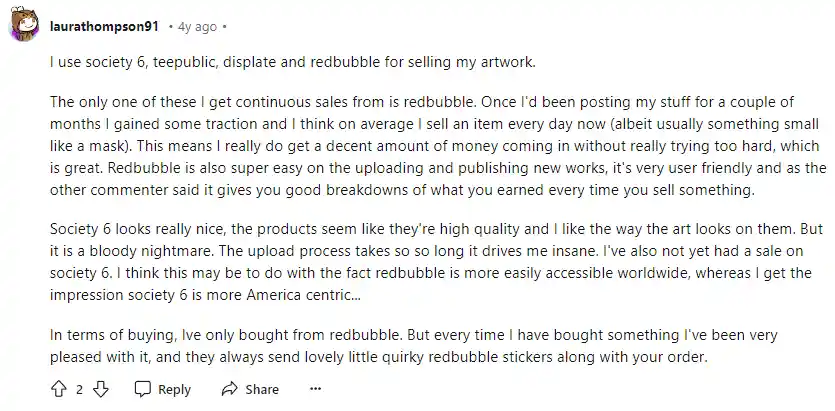
Over on the Threadless forum, WeirdPeople echoes the sentiment about diversifying across multiple POD sites but points out a unique trend: Redbubble customers seem to have a particular fondness for stickers. This quirky preference can be a goldmine if you tailor your designs accordingly. They also praise the supportive community on Threadless, emphasizing the active Facebook group and the ability to set your own prices in the artist shop, which offers more control over your brand.

Digitalrose adds another layer to this comparison, confirming the popularity of stickers on Redbubble and sharing personal success stories. Despite having many designs favorited but not purchased, one popular design has led to significant profit over five years. However, she also warns about potential issues with copyright takedowns, reflecting a need for caution when creating fan art.

Ways to Drive More Traffic and Sales to Your Store
Optimize Your Product Listings
Product lists are like storefront window displays in busy shopping areas, they need to attract attention. Use high-quality images and compelling descriptions that highlight the unique features of your designs. Don't forget to sprinkle in relevant keywords to boost your search engine visibility. Remember, a well-optimized listing is like a magnet for potential customers.
Leverage Social Media
Social media is your best friend when it comes to driving traffic. Platforms like Instagram, Pinterest, and TikTok are visual-heavy and perfect for showcasing your designs. Share behind-the-scenes content, engage with your followers, and use hashtags strategically to reach a broader audience. Think of social media as your virtual megaphone—use it to shout out about your latest creations!

Run Promotions and Discounts
In the case of the same quality, everyone will prefer the lower price of the product. Selecting some products for promotion or offering a full discount code can not only effectively increase sales, but also create a sense of urgency and attract more buyers. Whether it's a limited-time offer or a seasonal sale, these tactics can boost your sales significantly. Another key point, please make sure not to cut too much profit, too low prices will also confuse customers and doubt the quality of the product.
Collaborate with Influencers
Don't think that working with influencers is just for big businesses, small businesses too. When an influencer introduces your product, it not only gives you a new audience, but the fans who follow this influencer will also be drawn to your product. So when choosing influencers, choose those who are more aligned with your product's style.
Expert Tips
Choosing between Redbubble and Threadless boils down to your personal goals and preferences as a creative. Redbubble shines with its user-friendly interface and global reach, making it a fantastic choice for those looking to gain traction quickly and effortlessly. Its popularity with sticker enthusiasts can also be a lucrative niche.
Threadless offers a vibrant community and more control over pricing, which can be incredibly empowering for artists who want to engage deeply with their audience and collaborate with fellow creatives. The supportive environment and active forums can provide invaluable feedback and inspiration.
Ultimately, both platforms have unique strengths that can help you grow your brand and increase sales. Whether you prioritize ease of use or community engagement, there's a place for your creativity to flourish. So, dive in, explore both options, and find the perfect fit for your artistic journey. The world is waiting for your designs!








 Global Shipping
Global Shipping





























